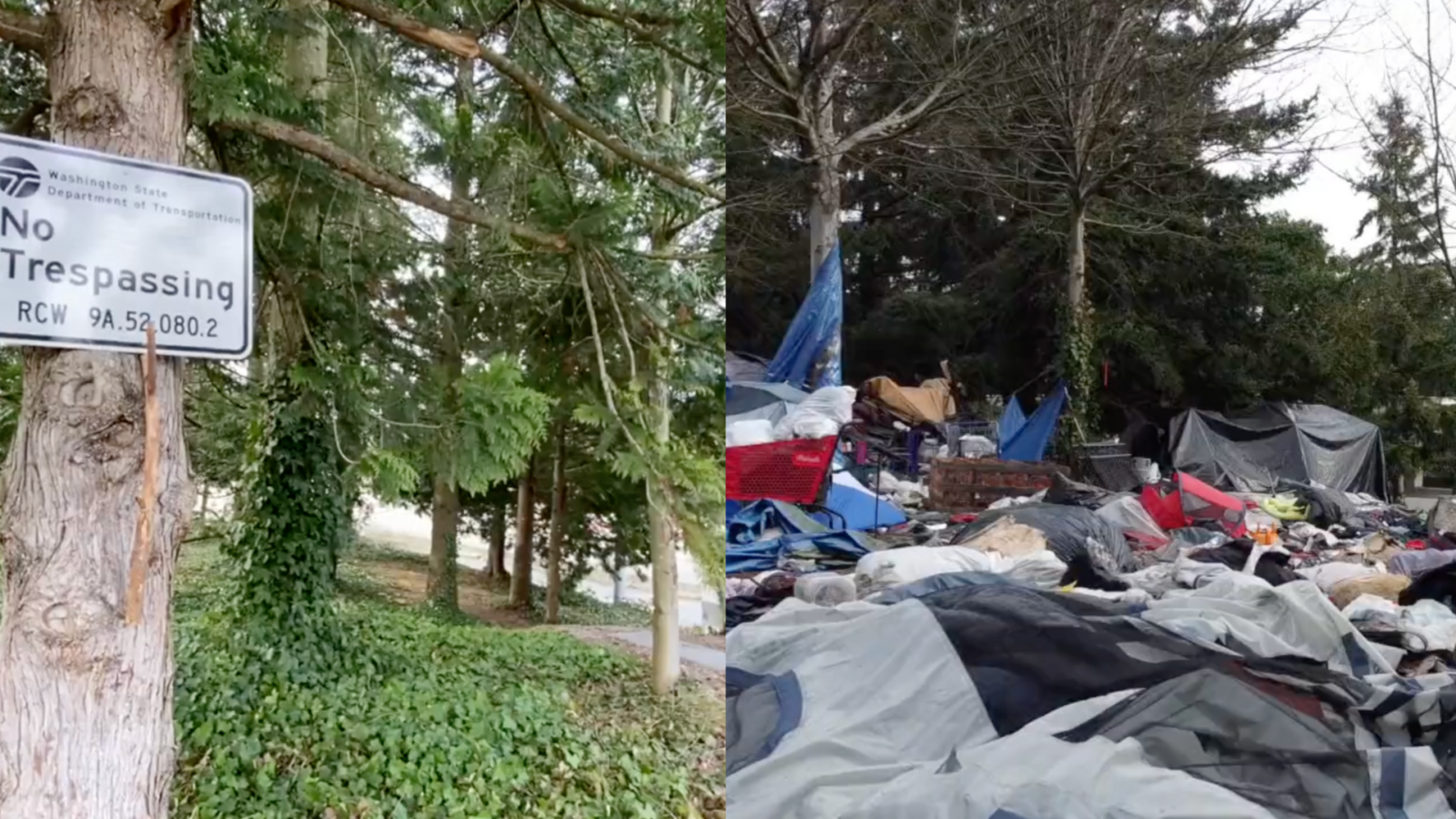Just minutes away from the Washington State Capitol, lawmakers watch helplessly as Olympia’s homeless crisis along a section of I-5on state highways spirals out of control.
Dozens of tents and structures crowd the space alongside the highway at the Sleater-Kinney Road exit. As more and more homeless people move in each day, the encampment spills into the surrounding community.
The scene is littered with trash, debris, and needles, which pile up until the wooded space is nearly unrecognizable as a forest. The disaster is being allowed to expand without intervention right next to several busy strip malls.
Tony Nguyen owns Saigon Fusion 8, a restaurant in one of the nearby strip malls. Nguyen says the homeless people living in the encampment come in here every night.
The local business owners are dealing with a spike in thefts and drug overdoses in their bathrooms. Nguyen tells me that the homeless people who frequent the area steal “anything they are able to take” from his restaurant.
As a result of the crime and safety threats, many customers now avoid the businesses.
Nguyen assures me that he’s complained to the city and called the police, but they say “they can’t do anything” about the situation.
According to a security guard hired to monitor the Hobby Lobby parking lot in the same area as Nguyen’s restaurant, drug dealers in luxury cars are constantly pulling into the parking lot and preying on those living in the encampment.
“The drugs are the issue when it comes down to it,” the guard tells me. Drug dealers will keep taking advantage of those addicted and without housing because, “they’ve got a supply and demand.”
As I film the scene at the highway encampment, a homeless woman named Alli Wilson invites me into her tent. I learn that she “just got her a couple weeks ago.”
Inside her tent, Wilson’s friend sits passed out on a camping chair, foil still in his hands, after smoking fentanyl.
When I ask her if she’s worried about her safety while living this way, Wilson assures me that “most of the people out here are my family,” and says the others living around her are “all each other has.”
Wilson tells me the homeless are not all criminals, but she admits that most of those living in the encampment are addicted to some type of hard core substance. Still, that “doesn’t define who we are as people,” says Wilson.
This American tragedy is unfolding in Governor Jay Inslee’s backyard. But he declined to comment or to be interviewed on the issue. Instead, I was referred to the Washington State Department of Transportation (WSDOT).
Unsurprisingly, WSDOT agency leaders also declined to comment or be interviewed. Instead, they sent me a statement insisting that “moving individuals from a site requires an offer of housing and there currently are not enough available beds to offer.”
Olympia’s City Manager, Mayor, and Councilmembers all declined to answer questions on camera, but a spokesperson says they’re working closely with the state to help place people into long term housing. There’s no timeline for this action.
What I witnessed in Olympia looks nothing like compassion to me.
Across the highway, the encampment scene in Olympia is juxtaposed with clear, clean forest lining the highway in the city of Lacey.
The stretch of highway cluttered with trash, debris, and needles on the Olympia side is clean and tent free on the Lacy side.
That’s because Lacey officials “have absolutely different viewpoints on how it should be handled” according to Lacey City Councilmember, Lenny Greenstein.
In Lacey, the Police Department has been empowered by WSDOT to enforce trespassing laws and make arrests.
Lacey Police Chief, Robert Almada, firmly believes that leaving homeless people in dirty, dangerous encampment conditions is unacceptable. So, his agency got permission from WSDOT to take the lead on clearing the encampments.
Officer Almada tells me that it was a process of building relationships and trust with the homeless, “finding out who they are, what they needed, and how we could help them”, that made the difference.
In their efforts to clear the encampments, the Lacey Police Department “worked with different service providers throughout the county” to find better living options for 75 of the individuals.
Many months later, this stretch along the highway in Lacey remains clear.
Candace Mercer is an independent journalist who covers local politics in Olympia. Mercer thinks the way forward is “a matter of exposing” how city leaders have taken progressive ideology to an extreme and allowed a minority of activist voices to influence the politics surrounding homelessness.
Mercer describes the current political environment as “magical thinking” in which it’s “more compassionate to let people stay in the camps…or at least until everyone gets long term housing like apartments rather than congregate shelters.”
Until this kind of wishful thinking changes, Mercer insists that the state right of ways on the Olympia side of the highway will remain “out of control.”

